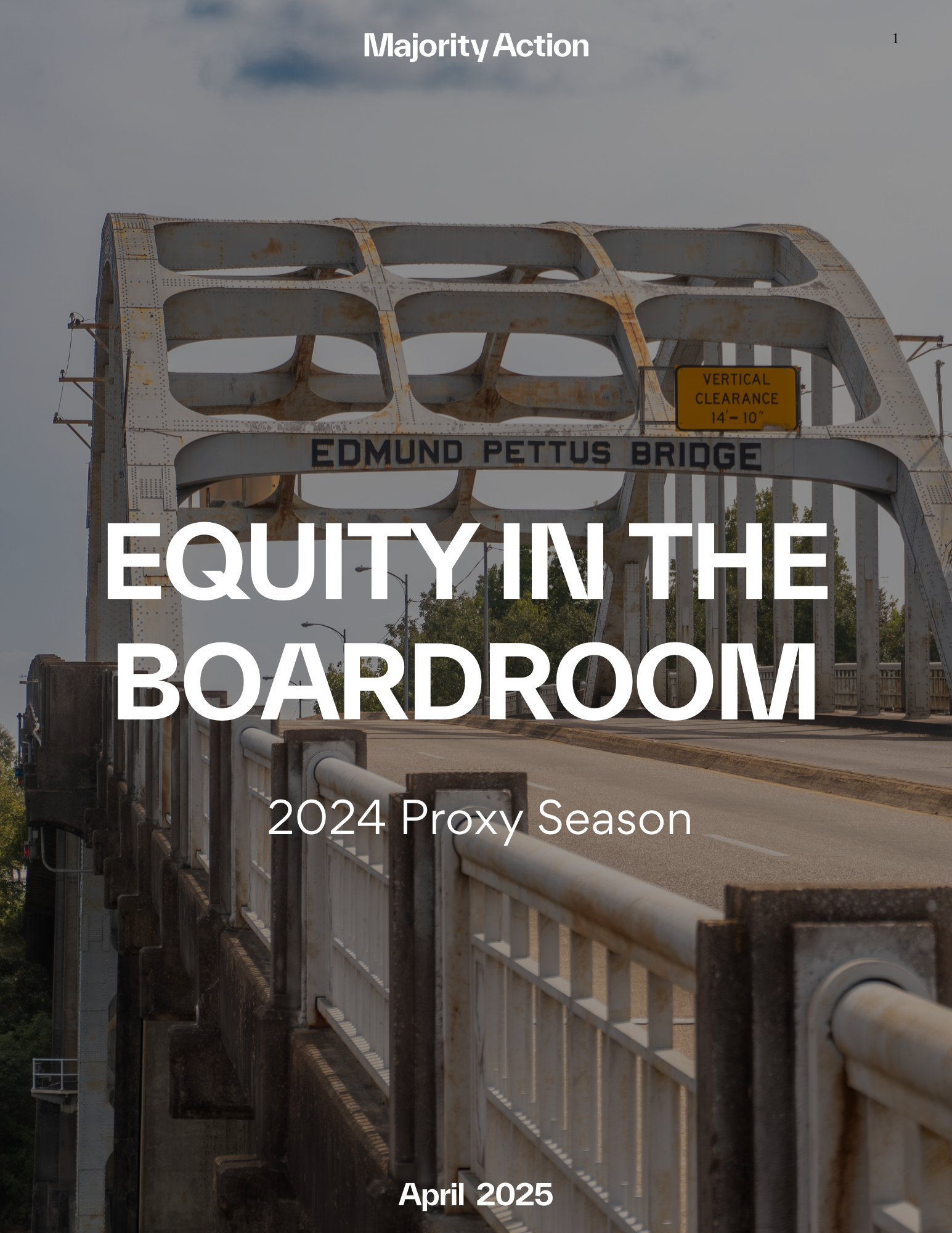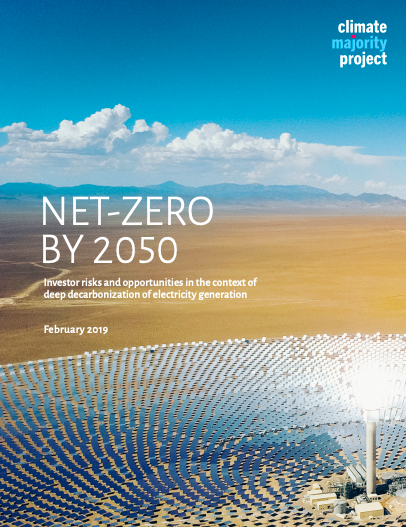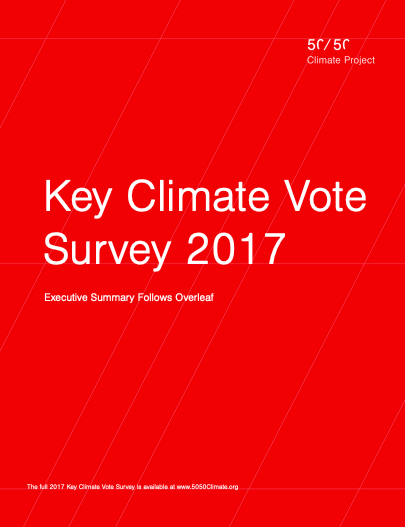Featured Reports
Below are MA's Research Reports. For SEC Filings 2020 and prior, click here
Equity in the Boardroom
Equity in the Boardroom: 2024 Proxy Season
Report - April 2025. Equity in the Boardroom 2024 examines how the “Big Four” – BlackRock, State Street, Vanguard, and Fidelity (as well as Geode, Fidelity’s index fund manager) – voted on 70 shareholder proposals across five categories – freedom of association, workplace safety, racial and gender equity in the workplace, the future of work, and corporate political transparency – that are key to mitigating inequality-related risks and creating a fair and resilient economy rooted in broad-based, inclusive growth. The report also explores the divergence in proxy voting between the largest managers of U.S. defined benefit assets – BlackRock and State Street – and the largest U.S. public pensions, which are among their largest and most important clients.
Climate in the Boardroom
Climate in the Boardroom: 2024 Proxy Season
Report - February 2025. Climate in the Boardroom 2024 examines the climate proxy voting of the four largest asset managers during the 2024 shareholder season. The report examines how the Big Four asset managers voted on climate shareholder proposals and key climate director elections, takes a deeper dive into the climate voting performance of their ESG-marketed funds, and looks at the divergence between the ten largest public pension plans and the two largest asset managers of defined benefit assets
Equity in the Boardroom
Equity in the Boardroom: 2023 Proxy Season
Report — February 2024. Besides being a moral failing, racial inequity poses idiosyncratic and systemic risks that depress returns for long-term diversified investors. Fiduciaries must adopt a racial equity lens to proxy voting in order to effectively mitigate these risks. Equity in the Boardroom analyzes how the 18 largest asset managers and two leading proxy advisors voted/recommended on key racial equity-related issues during the 2023 proxy season. Asset managers’ support for racial equity-related proxy votes slowed considerably against the backdrop of coordinated right-wing attacks on civil rights, affirmative action, and voting rights, and the related politicization of environmental, social, and governance (ESG) investment strategies. Asset managers’ inaction on systemic racism comes at the expense of not only communities of color who bear the brunt of harmful corporate behaviors, but also the tens of millions of workers – many of whom are people of color themselves – with retirement accounts, health savings accounts, and college savings accounts. Against current political headwinds, asset managers must rise to the occasion and use their proxy voting power to address systemic racism – consistent with their fiduciary duty to minimize risk, protect the value of client assets, and fortify long-term investment returns.
For more information, contact info@majorityact.org
Equity in the Boardroom
What Makes a Racial Equity Audit?
Fact Sheet. In the words of Laura Murphy, “The goal of a civil rights audit is to systematically examine significant civil rights and racial equity issues that may exist in a company and to develop a public plan of action to address them in a thorough, deliberate, timely, and transparent manner.” This fact sheet provides an summary of how a high-quality racial equity audit should be conducted and what it should include.
Equity in the Boardroom
Big Money, Big Problems: How Asset Managers Help Corporations Buy Political Power and Hide it from Shareholders
Congressional Brief — February 2024. Corporations have captured the U.S. political system, undermining democracy and halting progress towards racial equity. During the 2023 proxy season, the "Big Four" asset managers -- BlackRock, State Street, Fidelity, and Vanguard -- consistently blocked shareholder proposals seeking greater corporate political transparency. As we enter a presidential election year, the Big Four's reluctance to vote for proposals that seek to elucidate the full extent of corporate influence in politics and policy has serious consequences for the future of democracy, racial equity, and long-term value creation for diversified investors.
For more information, contact info@majorityact.org
Climate in the Boardroom: How Asset Manager Voting Shaped Corporate Climate Action in 2023
Investors across the shareholder ecosystem witnessed one of the hottest years on record, with 2022 economic losses from climate disasters totaling $165.1 billion in the U.S. alone, impacting both short and long-term investment value creation. Yet, the majority of the largest asset managers have continued to shirk their responsibility to hold climate-critical companies accountable for a responsible transition to a sustainable economy, according to Majority Action’s latest report analyzing the proxy voting of the largest asset managers in 2023.
Three years after a national reckoning on racial inequity after the murder of George Floyd produced an outpouring of statements from the world’s largest asset managers acknowledging their responsibility for addressing racial inequity, a new report from Majority Action shows that BlackRock, Vanguard, State Street, and Fidelity have serious gaps in their proxy voting policies that hold them back from mitigating the systemic risk of racial inequity.
Analysis: State Street Takes a Major Step Backwards on Climate
State Street Global Advisors (SSGA) recently modified its proxy voting policies and related documents, taking a material step backwards in mitigating the systemic risk posed by climate change.
We find that SSGA:
Fails to follow through on its January 2022 commitment to hold directors accountable to a clear ten-point list of climate expectations in the 2023 proxy season
Retreats to a vague TCFD disclosure recommendation to portfolio companies, no stronger than what it had in place in 2017
No longer acknowledges that climate is a systemic risk
Deletes all references to the Just Transition
Deletes references to its commitment to the Net Zero Asset Managers (NZAM) initiative
Climate change poses significant, undiversifiable, portfolio-wide risks to long-term and institutional investors with broad market exposure. During the 2022 proxy season, there was a growing divide between the four largest asset managers — BlackRock, Vanguard, Fidelity, and State Street Global Advisors— and their peers that are increasingly holding board directors accountable for corporate climate performance. Read our report.
Equity in the Boardroom: How Asset Manager Voting Shaped Corporate Action on Racial Justice in 2022
Equity in the Boardroom: How Asset Manager Voting Shaped Corporate Action on Racial Justice in 2022 shows that while shareholder proposals related to racial equity and justice received wide support from shareholders, the four largest asset managers – BlackRock, Vanguard, State Street, and Fidelity – lagged their peers in backing these essential initiatives. As a result, these four asset managers undermined dozens of critical shareholder proposals addressing racial equity from reaching majority support.
Fulfilling the Promise 2023: How Climate Action 100+ Investor-Signatories can Mitigate Systemic Climate Risk
US-based companies are overwhelmingly off-track to meet the standards of Paris-aligned climate performance and governance set by the Climate Action 100+ Initiative Net Zero Company Benchmark, yet the largest Climate Action 100+ investor-signatories are failing to hold boards of directors accountable for these failures. Read our report.
Fulfilling the Promise: How Climate Action 100+ Investor-Signatories Can Mitigate Systemic Climate Risk
The world’s largest investor initiative, Climate Action 100+, has united an unprecedented $60 trillion in assets under management (AUM) under the banner of ensuring that the world’s largest emitters take the “necessary action” on climate change. Unfortunately, the efforts and effectiveness of this initiative and its leading investors to hold the boards of high emitting companies accountable are being systematically undermined by the proxy voting behavior of many of its largest investor-signatories. Read the report.
Equity in the Boardroom: How Asset Manager Voting Shaped Corporate Action on Racial Justice in 2021
Earlier this year, ahead of annual shareholder meetings, more than 140 racial justice leaders and allies signed a full-page ad in the Financial Times calling on the biggest asset managers to stand by their public statements of support for the Black Lives Matter movement and use their power as large shareholders to address corporate contributions to systemic racism. Instead, as Equity in the Boardroom: How Asset Manager Voting Shaped Corporate Action on Racial Justice in 2021 demonstrates, major asset managers failed to use their outsized proxy voting power to hold corporate boards accountable for harmful and inequitable practices and governance. Download the Report
Climate in the Boardroom: How Asset Manager Voting Shaped Corporate Climate Action in 2021
In 2021, proxy voting by asset managers with over $1 trillion in AUM remained insufficient to the scale and urgency of the climate crisis. Without additional board-level accountability from these largest and most influential shareholders to transition to net-zero pathways, companies in climate-critical industries such as oil and gas, electricity production, and financial services will continue to drive warming beyond 1.5°C—threatening the lives and livelihood of millions and placing trillions of dollars of shareholder value and financial system stability at increasing risk. Read the report
Equity in the Boardroom: How Asset Manager Voting Shaped Corporate Action on Racial Justice in 2020
In 2020, BlackRock and Vanguard, the world’s largest asset managers and among the top three shareholders in the vast majority of S&P 500 companies, overwhelmingly voted to undermine investor efforts to promote racial equity in corporate governance—despite public statements supporting movements for racial justice. Read the report
Climate in the Boardroom: How Asset Manager Voting Shaped Corporate Climate Action in 2020
Large asset managers have the power to hold climate-critical companies accountable to undertaking the urgent transformations that our climate crisis demands. But while some top investment managers are leading the way, BlackRock and Vanguard persist in using their shareholder voting power to shield corporate boards from accountability. In 2020, BlackRock and Vanguard, the world’s largest asset managers and among the top three shareholders in the vast majority of S&P 500 companies, continued to undermine global investor efforts to promote responsible corporate climate action—despite their public commitments to hold corporate directors accountable in the 2020 proxy season. Read the Report
Investing in Failure: How Large Power Companies Are Undermining Their Decarbonization Targets
Duke, Dominion, and Southern, three of the US’s largest electric power companies, recently announced varying commitments to decarbonization by 2050. However, a new analysis of their regulatory filings finds these three companies' power plant fleets are all heading to emit roughly double the quantity of CO2 emissions required to decarbonize by 2050. Read the report
Climate in the Boardroom: How Asset Manager Voting Shaped Corporate Climate Action in 2019
Large investors have the power to hold energy and utility companies accountable to undertaking the urgent transformations that our climate crisis demands. But while some top investment managers are leading the way, BlackRock and Vanguard persist in using their shareholder voting power to shield corporate boards from accountability. This report reviews the 2019 voting patterns of the 25 largest global asset managers on director elections, executive pay, and critical climate shareholder proposals and offers recommendations for asset owners and policymakers alike. Read the report
Net-Zero By 2050: Investor risks and opportunities in the context of deep decarbonization of electricity generation
In recent years, institutional investors worldwide have won substantial advances in corporate disclosures and engagement on climate change. Companies across a range of industries have set emissions reductions targets, undertaken scenario planning, and made meaningful disclosures of climate-related risks. Moreover, despite the Trump Administration’s announced plan to withdraw from the 2015 Paris Agreement, investors joined with mayors, governors, and business leaders across the United States in the "We Are Still In" coalition, re-doubling their commitment to meeting the agreement's goals of keeping warming to well below 2°C above pre-industrial levels, and pursuing efforts to limit warming to 1.5°C. Read the Report
Asset Manager Climate scorecard 2018
The accelerating climate crisis is making the transition to a low-carbon economy urgent. Increasingly, investors and other stakeholders are asking corporate leaders to decarbonize their business models and to exercise their political influence in support of a clean economy. While some progress in these directions is being made, research from CERES, Carbon Tracker, the 50/50 Climate Project and others has shown that business model transformation is proceeding unevenly in both the oil and gas and utilities industries. High carbon-emitting industries continue to exert extensive political influence in support of the status quo, executives remain incentivized to maximize fossil fuel utilization, and boards lack the experience with and knowledge of climate science and renewables needed to achieve business model innovation. Read the report
Proxy voting conflicts: Asset Manager Conflicts of Interest in the Energy and Utility Industries
All investors have choices about how to invest their financial resources, and most investors share the goal of aligning their investments with their long-term goals and interests. Moreover, investors generally expect that the fund managers they select to steward their investments are proactively encouraging the companies in their portfolios to address the spectrum of risks associated with their businesses, including environmental, social, and governance risks. However, many of the largest fund managers in the U.S. have failed to exercise their proxy voting responsibilities to address these concerns. Read the report
Spending Against Change: Key Metrics Assessment of Climate Change Governance and Political Influence Spending in the Energy and Utility Sectors
Twenty-one of the biggest energy and utility companies in the United States have minimal board oversight of climate risk and almost no board members with relevant climate-related expertise. These companies spent $673 million dollars over six years to influence the political system, predominantly with shareholder money. Companies directed three-quarters of the spending to lobbying, but only six of the 21 corporations voluntarily disclose these expenditures to their investors.
Utility Climate Change Readiness: A Business Plan Analysis
One of the most significant issues confronting organizations today relates to the risks associated with climate change. While it is widely recognized that continued greenhouse gas emissions will cause further atmospheric warming, and this warming is expected to lead to damaging economic and social consequences, the exact timing and severity of physical effects are difficult to estimate. The scale and time horizon of the problem make it uniquely challenging. Many organizations and their shareholders incorrectly perceive climate change implications to be strictly long term and, therefore, not especially relevant to decisions made today.
Key Climate Vote Survey 2017
The Key Climate Vote Survey (KCVS) is a resource for institutional investors seeking to better manage climate risk in their investment portfolios and ascertain how their investment managers are addressing this risk and promoting boardroom climate competence in their firm-wide proxy voting activities. The KCVS seeks to identify the most consequential 2017 votes on climate business risk shareholder resolutions and management proposals to elect directors and approve executive compensation. The KCVS then analyzes the publicly disclosed voting records of the largest global investment managers on these key proposals. The following report provides an indication of how effectively the largest financial management firms, through proxy voting, are overseeing investments, on behalf of long term asset owners, in the oil and gas and utility sector portfolio companies with the largest carbon footprints and greatest vulnerability to climate risks.























